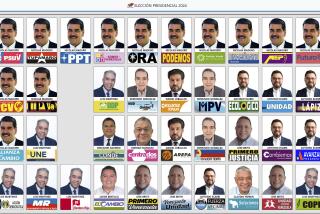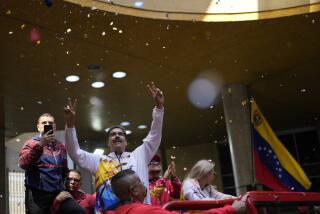Nominations for Multi-Candidate Election in March : Back-Room Maneuvers Mar Soviet Vote Drive
- Share via
MOSCOW — The middle-aged woman, clearly angry, burst into Tatyana Ivanova’s election commission office Tuesday with barely a glance at the Western reporter who was already there conducting an interview.
“I’ve looked everywhere, but there are no notices!” the intruder objected. “That means they notified only those whom they wanted to come! I want the address where the next meeting is to be held. I want to be present at a meeting which nominates a candidate in my name.”
Ivanova is the election commission secretary in Moscow’s Sverdlovsk District, and the incident occurred on the last day for nominating individuals for this country’s first-ever multi-candidate national elections.
It underlined the apparent paradox behind what has been billed as the cornerstone of the more open and democratic political system that Soviet President Mikhail S. Gorbachev says is essential for his reform program to work.
As Ivanova’s angry intruder inferred, the results of elections scheduled March 26 for a new national parliament are already being manipulated in the Soviet equivalent of smoke-filled rooms. But even this carefully controlled exercise in Soviet-style democracy has encouraged the beginnings of grass-roots political expectations that could have important influence on the shape of life here for years to come.
Call for Freedom
Whatever the outcome, the campaign has already seen the Nobel prize-winning, former dean of Soviet dissidents, Andrei D. Sakharov, get up before audiences of several hundred Muscovites to call for full freedom of movement for Soviet citizens, parliamentary control over the KGB, the Soviet secret police, and introduction of a multi-party system.
It has also seen frustrated, would-be candidates go on hunger strikes to protest the shenanigans of unreformed party bosses blocking their way, and official newspapers joining the outcry against the most blatant abuses of the electoral law.
The Soviet Union has had elections before, but the ballot had always listed only one name for each post--the name of the candidate chosen by the party. Reluctant citizens were rousted by party activists on election day to go through the charade of dropping their ballots in a box at the local polling station. If they didn’t, someone else usually did it for them, producing the perennial 99% “landslide” victories for the party.
Unlike some of its East European allies, the Kremlin is clearly not interested in experimenting with even a restricted multi-party system. However, two years ago it did allow the first local trials of multi-candidate ballots. And now such pluralism will be tried on a national level for the first time in the upcoming parliamentary election.
Referring to the change last month, Gorbachev said the reform is essential.
“It is only by combining economic reform with political changes, democratization and glasnost (openness), that we can fulfill both the immediate and long-term tasks we have set ourselves,” he said.
Pushed Through Reform
Simultaneously, the Soviet leader pushed through reform of the legislature, creating a new and ostensibly more influential body to replace the old Supreme Soviet, which did nothing but rubber-stamp decisions already made by the Communist party.
A new, 2,250-member Congress of People’s Deputies is to function as the lower level of a two-tier parliamentary system. It is to meet annually and to elect from its ranks a 422-member Supreme Soviet that will remain in session for up to eight months a year. That body, in turn, is to elect a president--expected to be Gorbachev--with sweeping executive powers.
The current election campaign is to select the first members of the Congress of People’s Deputies. One-third of that body is to be selected by a wide variety of “social organizations” ranging from the Communist Party (100 seats) to the All-Union Temperance Society (one seat). The other 1,500 members are to be chosen from two different types of territorial constituencies.
Tuesday marked the end of a nominating phase that has already soured many who had hoped to see evidence of more genuine democratic processes at work.
The Communist Party set a poor example when the top leadership endorsed only 100 candidates for the 100 seats set aside for it in the new parliament. By doing so, the 12 voting members of the ruling Politburo left no choices for the approximately 460 full and non-voting members of the party’s Central Committee, which is formally to designate its candidates in mid-March.
Rejected by Academy
Other institutions followed suit. The governing board of the Academy of Sciences selected 23 scientists as candidates to fill its 25 reserved places in the new Congress, effectively ceding its other two seats to another organization. In the process, they rejected Sakharov, who had been nominated by more than 50 institutes.
The rules of the process are murky enough that the government newspaper Izvestia could report that from a formal point of view, the academy did nothing illegal. “But it is impossible not to notice the obvious difference between the will of academic collectives and the decision made by the higher organization.”
It was also “a very noticeable fact that only the leaders of the Academy of Sciences got enough support at the sitting of the Academy of Sciences,” Izvestia added.
While he lost out on the 750 places reserved for representatives of “social institutions,” there are enough loopholes in the new election law so that Sakharov was able to win at least preliminary nominations for territorial seats in the Congress.
But there were also nominating problems for those constituencies, and survivors of the first phase of the process must still face a winnowing procedure whose rules will be made up as it progresses.
In Kolpina, a suburb of Leningrad, the local authorities blocked several hundred residents from nominating a candidate by arbitrarily decreeing that he had to have the approval of at least half the district’s 8,000 people.
V. Voblikov, a low-level party official in the northwest of the country, complained to Izvestia that he had been pressured to remove his name from the list so that D. V. Romanin, a much higher level party boss, could get the nomination.
In Stavropol, on the Black Sea, members of a grass-roots citizens group that named their organization after Gorbachev’s program of perestroika, or “restructuring,” went on a hunger strike after local leaders stacked a nominating meeting against their candidate.
“I believe a more democratic mechanism of nominating candidates is needed,” said Sakharov, who now faces the never-never land of the election campaign’s Phase Two.
The electoral commission for any constituency in which more than two candidates have been nominated must now decide whether to register all of the nominees, noted Sverdlovsk district election secretary Ivanova. It has until Feb. 23 to prepare a final list of candidates, who are then free to campaign for a month before the election.
Candidates who have been nominated for more than one territorial constituency, such as Sakharov and others, will have to chose where they want to run before being officially registered.
How many candidates will appear on the final ballot “is still unclear because the law does not place any limits on the number of candidates for one list,” Ivanova said.
Eight candidates were nominated for the ballot in her district, Ivanova noted. They include Boris N. Yeltsin, former Politburo member and Moscow party chief who was ousted 15 months ago after publicly attacking party hard-liners; Vitaly Korotich, a controversial, reform-minded editor at the forefront of the glasnost policy; a retired clown who now directs one of two Moscow circuses, and five officials of various labor, scientific and industrial organizations.
The commission will rely on a district-wide meeting to prune its candidate list, Ivanova said.
Who will attend the meeting?
Not Finalized
“It’s not decided upon so far. . . . It has not been finalized how, when, and who.”
The commissions are obviously the key in the next phase. So who are the members?
The one in Sverdlovsk district has 17 members, nine of whom are women and 14 of whom are party members, Ivanova said. She is one of the non-party members, and at 31 is the second youngest of the group. She works as a tester in an electrical equipment factory but is on leave until after the elections.
Everybody is still learning, Ivanova said--voters and election commission members alike. Maybe the law will be clarified before the second such multi-candidate elections, she added.
However they are conducted, another angry visitor saw the elections primarily as a last hope to exert leverage on the authorities.
An older woman in a blue cloth coat and wool hat, she admonished Ivanova: “How can you talk about all those candidates and election documents when we’re drowning in mud?”
She said she had been to every office she could think of to complain.
“I won’t vote unless you clean the streets!” she pledged.
More to Read
Sign up for Essential California
The most important California stories and recommendations in your inbox every morning.
You may occasionally receive promotional content from the Los Angeles Times.













